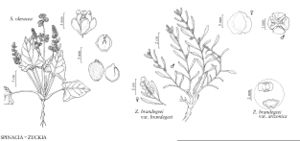Zuckia
J. Wash. Acad. Sci. 5: 58. 1916.
| Taxon | Illustrator ⠉ | |
|---|---|---|
 | Spinacia oleracea Zuckia brandegeei var. brandegeei Zuckia brandegeei var. arizonica | Bee F. Gunn Bee F. Gunn Bee F. Gunn |
Shrubs or subshrubs, dioecious or monoecious; herbage ± scurfy. Stems erect or ascending, branching from base, not jointed, not armed; axillary buds prominent, subglobose. Leaves alternate, subsessile or bases tapering to short petioles; blade linear or narrowly oblanceolate-spatulate to elliptic, ovate, obovate, or orbiculate, margins entire or rarely hastately lobed, apex acute or obtuse. Inflorescences commonly with some moniliform hairs; staminate flowers borne in spikes in apical axils or ± paniculate, glomerules 2–5-flowered; pistillate flowers 1–several per bract, often some vestigial. Staminate flowers not separately bracteolate, but with linear bracts subtending each spike; perianth 4 (–5) -lobed; stamens 4–5. Pistillate flowers each enclosed by 2 bracteoles connate nearly to apex; perianth absent; stigmas 2. Fruiting structures: bracteoles either veinless and laterally flattened and/or 1–3-veined adaxially, or rarely unequally 3-winged, enclosed achene vertical, or bracteoles transversely flattened, oval to hexagonal and not or unequally 1–4 (–5) -ridged, with 2 slightly enlarged wings, thus accommodating horizontal achene, margins not spongy-thickened; bracteoles lacking spongy cellular matrix, often subtended by single, filiform bractlet; pericarp adherent. Seeds reniform; seed-coat greenish, tuberculate; embryo annular; perisperm copious. x = 9.
Distribution
w United States
Discussion
Species 1.
Zuckia was erected by P. C. Standley (1916) to include a solitary species, Z. arizonica, based on low, shrubby plants from saline, fine-textured substrates in northern Arizona. That taxon stood apart from Grayia brandegeei A. Gray, a species otherwise closely similar in the compression of the bracts and the horizontal position of the seeds. In the present treatment both taxa are included within an expanded Zuckia.
Selected References
None.